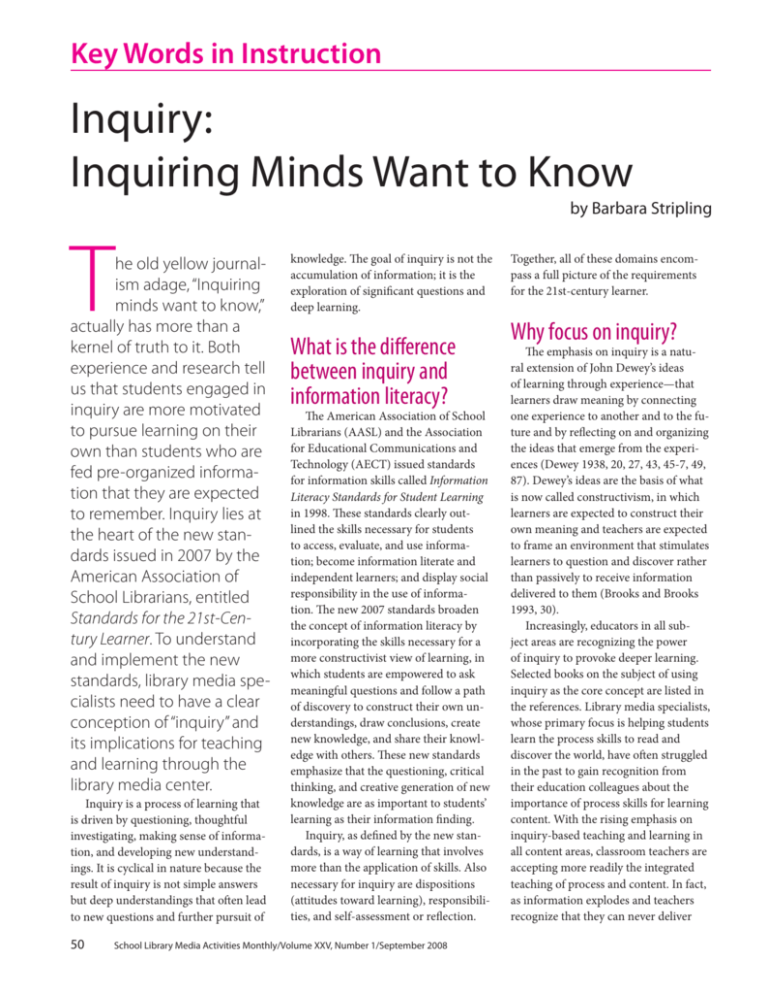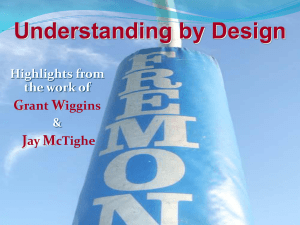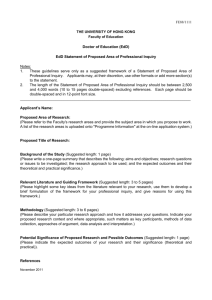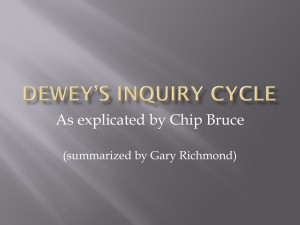
Key Words in Instruction
Inquiry:
Inquiring Minds Want to Know
by Barbara Stripling
T
he old yellow journalism adage, “Inquiring
minds want to know,”
actually has more than a
kernel of truth to it. Both
experience and research tell
us that students engaged in
inquiry are more motivated
to pursue learning on their
own than students who are
fed pre-organized information that they are expected
to remember. Inquiry lies at
the heart of the new standards issued in 2007 by the
American Association of
School Librarians, entitled
Standards for the 21st-Century Learner. To understand
and implement the new
standards, library media specialists need to have a clear
conception of “inquiry” and
its implications for teaching
and learning through the
library media center.
Inquiry is a process of learning that
is driven by questioning, thoughtful
investigating, making sense of information, and developing new understandings. It is cyclical in nature because the
result of inquiry is not simple answers
but deep understandings that often lead
to new questions and further pursuit of
50
knowledge. The goal of inquiry is not the
accumulation of information; it is the
exploration of significant questions and
deep learning.
What is the difference
between inquiry and
information literacy?
The American Association of School
Librarians (AASL) and the Association
for Educational Communications and
Technology (AECT) issued standards
for information skills called Information
Literacy Standards for Student Learning
in 1998. These standards clearly outlined the skills necessary for students
to access, evaluate, and use information; become information literate and
independent learners; and display social
responsibility in the use of information. The new 2007 standards broaden
the concept of information literacy by
incorporating the skills necessary for a
more constructivist view of learning, in
which students are empowered to ask
meaningful questions and follow a path
of discovery to construct their own understandings, draw conclusions, create
new knowledge, and share their knowledge with others. These new standards
emphasize that the questioning, critical
thinking, and creative generation of new
knowledge are as important to students’
learning as their information finding.
Inquiry, as defined by the new standards, is a way of learning that involves
more than the application of skills. Also
necessary for inquiry are dispositions
(attitudes toward learning), responsibilities, and self-assessment or reflection.
School Library Media Activities Monthly/Volume XXV, Number 1/September 2008
Together, all of these domains encompass a full picture of the requirements
for the 21st-century learner.
Why focus on inquiry?
The emphasis on inquiry is a natural extension of John Dewey’s ideas
of learning through experience—that
learners draw meaning by connecting
one experience to another and to the future and by reflecting on and organizing
the ideas that emerge from the experiences (Dewey 1938, 20, 27, 43, 45-7, 49,
87). Dewey’s ideas are the basis of what
is now called constructivism, in which
learners are expected to construct their
own meaning and teachers are expected
to frame an environment that stimulates
learners to question and discover rather
than passively to receive information
delivered to them (Brooks and Brooks
1993, 30).
Increasingly, educators in all subject areas are recognizing the power
of inquiry to provoke deeper learning.
Selected books on the subject of using
inquiry as the core concept are listed in
the references. Library media specialists,
whose primary focus is helping students
learn the process skills to read and
discover the world, have often struggled
in the past to gain recognition from
their education colleagues about the
importance of process skills for learning
content. With the rising emphasis on
inquiry-based teaching and learning in
all content areas, classroom teachers are
accepting more readily the integrated
teaching of process and content. In fact,
as information explodes and teachers
recognize that they can never deliver
all the important information in their
subject area, a new consensus is forming
about the necessity of teaching students
how, rather than what, to learn. Linda K.
Jordan probably expressed the views of
many teachers when she said this about
science inquiry: “Although inquiry may
not be the only way to teach science,
many science educators believe that it
may be the best way for students to learn
science” (Audet and Jordan 2005, 43).
What is the underlying
process of inquiry and
what skills are most
important?
Most models of inquiry follow the
same general cycle (Audet and Jordan
2005, 14; Stripling 2003, 7; Kuhlthau,
Maniotes, and Caspari 2007, 17-20;
Short et al. 1996, 18, 157):
▶Tap into prior experience, background knowledge
▶Generate intriguing questions or
problems that can be investigated
▶Develop a plan for investigation
▶Select resources—select, analyze,
and evaluate information that addresses the questions or problems
▶Organize information, find patterns, draw conclusions and new
understandings
▶Create demonstration of learning
and share with others
▶Reflect on the process and product
of learning; generate new questions
All research is messy and recursive;
inquiry is more so because no one
knows the end. Even if students are inquiring about a topic that has been studied before, the new understandings that
are gained are unique to those students
and to the connections that they make.
Throughout the process, students reflect
on what they are observing and finding
out. They may change direction, ask new
questions, challenge the inconsistencies
they discover, seek new perspectives,
and fill gaps in their information.
The skills included in the AASL
Standards for the 21st-Century Learner
outline an active discovery process for
all learners as revealed by the verbs
used in the indicators—inquire, use,
think critically, apply, create, share, read,
pursue, develop, evaluate, make sense of,
demonstrate, organize, listen, collaborate, conclude, connect, respond, and
seek (2007). The attitudes toward learning, called dispositions in action, are
also stated in active terms (e.g., display,
demonstrate, maintain a critical stance,
employ, use, and show) so that educators
can gauge the degree to which students
are displaying the habits of mind that
lead to successful inquiry and learning. Because the aim of inquiry is active
discovery, library media specialists and
classroom teachers can employ formative assessment to track the actions of
students and assess their progress in attaining and using skills and dispositions
throughout the inquiry cycle.
question, hypothesize, and investigate the natural world. Their inquiry
is guided by a search for accurate and
replicable evidence in order to confirm
or refute a hypothesis and draw conclusions about the truth. Similarly to mathematics, the evidence is evaluated for its
credibility and accuracy, not its point
of view or social context. Identifying
misconceptions is particularly important
for science inquiry because most people
tend to form theories about the way the
world works through simple observation rather than investigation. Fallacious
theories are not easily replaced unless
they are brought to the surface and
countered with more accurate information (Stripling 2003, 21-23).
Inquiry in history and the social
sciences focuses on people and their
interactions with the world. As a result,
students must assess the evidence for
Increasingly, educators in all subject
areas are recognizing the power of
inquiry to provoke deeper learning.
How does inquiry differ
across content areas?
Although the process of inquiry is
much the same as it is applied in various
content areas, the emphasis may be on
different types of thinking. In mathematics, for example, inquiry in the
curriculum focuses on problem-solving
and reasoning. Students are expected to
look for patterns and relationships that
explain the physical world. The patterns/relationships exist as truths that
are not dependent on the time (when),
the place (where), or the reason (why)
of the problem; therefore, students must
be concerned with accuracy and logical
reasoning, not with point of view or
context (Stripling 2003, 23-24).
Science students are expected to
point of view, social and historical
context, authoritativeness, credibility,
and other qualitative factors. In the
social sciences, students inquire to find
multiple truths as representative of different perspectives and different time
periods. Inquiry in the social sciences is
concerned with the interplay of “Why?,”
“Who?,” “Where?,” “When?,” “What
caused?,” “What resulted?,” and “How
good or bad?” rather than the “How?” or
“What?” of science and math. Interpretation of evidence and drawing conclusions in social-science inquiry are very
complex processes that must be based
on students carefully evaluating the evidence without succumbing to their own
personal biases. It may be important for
students to identify their own point of
view before social-science inquiry, just
School Library Media Activities Monthly/Volume XXV, Number 1/September 2008
51
as students in science must identify their
own misconceptions (Stripling 2003,
24-27).
Inquiry in language arts and literature is based on interpretation of evidence that includes weighing the social
context, determining point of view and
author’s purpose, questioning, identifying main ideas and supporting details,
making inferences, and synthesizing. Inquiry about literature (both fiction and
nonfiction) must be very text-based with
background material used as a context
for interpretation of the text. Inquiry in
the language arts classroom that is not
tied to literature often provides a rich
opportunity for students to choose any
researchable subject of personal interest.
The skills most important for individualized inquiry will vary according to the
subject chosen (Stripling 2003, 27-29).
See “Use This Page” (page 2)
for a more specific outline of the
role of the library media specialist
implementing inquiry-based
teaching and learning.
What is the role of the
library media specialist
in inquiry-based teaching
and learning?
The goal of inquiry-based teaching
is that all students develop an “inquiry
stance” with more emphasis on asking
good questions than finding the answers
(Cochran-Smith and Lytle 1999). The
payoff in terms of in-depth learning is
profound: “Students can and do learn
about subjects in teacher-centered classrooms, but they learn best in a learnercentered environment that emphasizes
inquiry” (Audet and Jordan 2005, xiii).
Every inquiry learning experience
should start with a challenging problem or question (often generated by
the students) that is meaningful and
worthy of deep exploration. Questions
that are connected to students’ own lives
and their prior knowledge are the most
intriguing and authentic, and, therefore,
52
motivating to students. Once students
have constructed new understandings based on their investigations, they
should be given opportunities to apply
them to new situations.
To achieve this level of inquiry-based
learning, the library media specialist’s
role involves collaboration, teaching,
and collection development, as well as
leadership and professional development. There are many ways the library
media specialist can approach these
roles. In terms of collaboration, the
library media specialist must work with
teachers to help restructure the curriculum, foster cross-curricular connections,
and incorporate AASL Standards for the
21st-Century Learner. Library media
specialists as teachers must be able to
establish learner-centered environments,
foster active and reflective learning, and
enhance and support student learning while focusing on AASL Standards
for the 21st-Century Learner. Through
collection development, library media
specialists must provide the resources
(physical and virtual) required to meet
the demands of an inquiry approach to
learning and teaching. They must also be
leaders by fostering and encouraging inquiry throughout the school and by providing and participating in professional
development opportunities related to
inquiry-based teaching and learning.
Why focus on inquiry?
Inquiry is certainly not a panacea for
all of the issues that students, teachers,
and library media specialists face in our
schools today. Library media specialists
who understand the inquiry process and
how it contributes to learning across the
curriculum, however, will be prepared to
integrate inquiry experiences whenever
they are appropriate. Each time students
participate in a successful inquiry activity and acquire new skills of questioning,
investigation, and discovery, the library
media center has fostered a culture of
inquiry in the school and enhanced the
understanding of content and the acquisition of lifelong learning skills—the
School Library Media Activities Monthly/Volume XXV, Number 1/September 2008
true intent of AASL’s new Standards for
the 21st-Century Learner.
References
American Association of School Librarians.
Standards for the 21st-Century Learner.
American Library Association, 2007.
American Association of School Librarians and
Association for Educational Communications and Technology. Information Literacy
Standards for Student Learning. American
Library Association, 1998.
Audet, Richard H., and Linda K. Jordan (eds.).
Integrating Inquiry across the Curriculum.
Corwin Press, 2005.
Bransford, J. D., A. L. Brown, and R. Cocking,
eds. How People Learn: Brain, Mind, Experience, and School. National Academy Press,
1999.
Brooks, Jacqueline Grennon, and Martin G.
Brooks. In Search of Understanding: The Case
for Constructivist Classrooms. ASCD, 1993.
Cochran-Smith, M., and S. Lytle. “Relationships
of Knowledge and Practice: Teacher Learning in Communities.” Review of Research in
Education 24, no. 8 (1999): 249-305.
Dewey, John. Experience and Education. Simon
and Schuster, 1938.
Donham, Jean, Kay Bishop, Carol Collier
Kuhlthau, and Dianne Oberg. Inquiry-Based
Learning: Lessons from Library Power. Linworth Publishing, 2001.
Kuhlthau, Carol C., Leslie K. Maniotes, and
Ann K. Caspari. Guided Inquiry: Learning in
the 21st Century. Libraries Unlimited, 2007.
Mills, Heidi, and Amy Donnelly. From the
Ground Up: Creating a Culture of Inquiry.
Heinemann, 2001.
National Research Council. Inquiry and the National Science Education Standards: A Guide
for Teaching and Learning. National Academy
Press, 2000.
Short, Kathy G., et al. Learning Together through
Inquiry: From Columbus to Integrated Curriculum. Stenhouse Publishers, 1996.
Stripling, Barbara K. “Inquiry-Based Learning.” In Curriculum Connections through the
Library, edited by Barbara K. Stripling and
Sandra Hughes-Hassell. Libraries Unlimited,
2003.
Weinbaum, Alexandra, et al. Teaching as
Inquiry: Asking Hard Questions to Improve
Practice and Student Achievement. Teachers
College Press and National Staff Development Council, 2004.◀
Barbara Stripling is the Director of Library
Services for the New York City Department
of Education. Email: bstripling@schools.
nyc.gov
Use This Page
Inquiry-based Teaching and Learning—
The Role of the Library Media Specialist
by Barbara Stripling
An extension of “Inquiry: Inquiring Minds Want to Know” (SLMAM, September 2008: 50-52).
Collaboration
Collaboration underpins the success
of any library media program. The library
media specialist and classroom teachers must
support each other because inquiry takes
more time, the path may be unpredictable,
the teacher is not always in control, students
need a lot of support throughout the process,
students need resources beyond the classroom on an unpredictable variety of subjects,
and amid all the complexities, students must
be surrounded by a safe and well-organized
learning environment.
Through collaboration, the library media
specialist can:
▶Help restructure the curriculum so that
inquiry and problem solving are integrated into all subject areas.
▶Foster connections across curriculum
areas, a focus on broad concepts instead
of isolated facts, and the true blending of
content and process.
▶Incorporate the American Association
for School Librarians (AASL) Standards
for the 21st-Century Learner.
Teaching
The goal of inquiry-based teaching is that
all students develop an “inquiry stance” with
more emphasis on asking good questions
than finding the answers (Cochran-Smith
and Lytle 1999).
Library media specialists can:
▶Establish a learner-centered environment
by gradually releasing responsibility to
the students.
▶Integrate the teaching of habits of mind
(Audet and Jordan 2005, 89-90) with inquiry and communication skills to foster
both active and reflective learning.
▶Enhance students’ effectiveness in
learning when they pay attention to the
learning environment of the library and
attend to four main areas that comprise
a climate that fosters inquiry (Bransford,
Brown, and Cocking 1999, 121):
1. Learners’ skills, attitudes, prior knowledge, interests.
2. Knowledge formation through con-
nections among ideas, focus on big
concepts and intriguing questions,
integration of skills and dispositions.
3. Assessment by both teacher and
student of process and content of
learning.
4. Community of learners that surround
the learning experiences with sharing,
interchange of ideas, listening to and
challenging the ideas of others.
▶Scaffold and support students through
the difficult process of inquiry, but also
challenge superficial ideas and uncritical
acceptance of evidence if students are to
reach as high as they can in their learning (Donham 2001, 3).
▶Integrate and implement AASL's Standards for the 21st-Century Learner.
Collection Development
Inquiry is obviously dependent on availability of instructional materials and equipment. Inquiry is, in fact, a major incentive for
a school to invest in a library media center.
Library media specialists can:
▶Provide both physical and virtual
resources that are tied closely to
curriculum areas of emphasis by
involving teachers in the selection
process. For example, Web sites that
are particularly good for specific units
can be made available for easy access
through the library home page, wikis,
portals, and special bookmarking sites
like del.icio.us.
▶Place special emphasis on providing
access to multiple perspectives and on
offering materials for in-depth study, not
superficial grazing.
▶Advocate for technology that is essential
for access to a wide variety of resources.
▶Assist in providing guidance and
instruction in the use of technology for
learning.
▶Assist in providing guidance in the use of
books and periodicals.
▶Assist in incorporating students’ use of
technology for inquiry learning involving social tools to share and build on the
ideas of others, and to demonstrate their
learning to a broader community.
Leadership and
Professional
Development
In effective professional development,
teachers are guided to (National Research
Council 2000, 91-98):
▶Do inquiry themselves multiple times;
▶Reflect on their own inquiry experiences;
▶Develop conceptual understanding of
their content area and of inquiry;
▶Be a part of a collaborative community
of inquiry;
▶Assess their own teaching practices and
content priorities in terms of effectiveness of student learning; and
▶Rethink instructional time to build in
inquiry experiences.
Library media specialists can:
▶Provide professional development (in
the form of workshops, study groups,
mentoring, or collaborative planning)
that offers teachers opportunities to
participate in inquiry-based experiences
and hone their own skills and confidence in inquiry-based teaching.
▶Take a leadership role in fostering inquiry throughout their school community
by communicating with administrators
about the attributes and requirements
of inquiry-based teaching and learning, so that the administrators support
teachers and foster a schoolwide culture
of inquiry.
▶Seize every opportunity to reach out
to parents and interpret inquiry-based
teaching and learning for them through
newsletters, parent/teacher conference
nights, special workshops and programs,
and presentations of student projects
(Inquiry Nights).
See reference list on page 52 in this issue of
SLMAM.◀
Join Kristin Fontichiaro at the SLMAM blog for
ongoing discussion and information related
to AASL's Standards for 21st-Century Learner
(http://blog.schoollibrarymedia.com/).
All rights reserved. Permission granted to reproduce for nonprofit educational purposes. http://www.schoollibrarymedia.com
2
School Library Media Activities Monthly/Volume XXV, Number 1/September 2008







